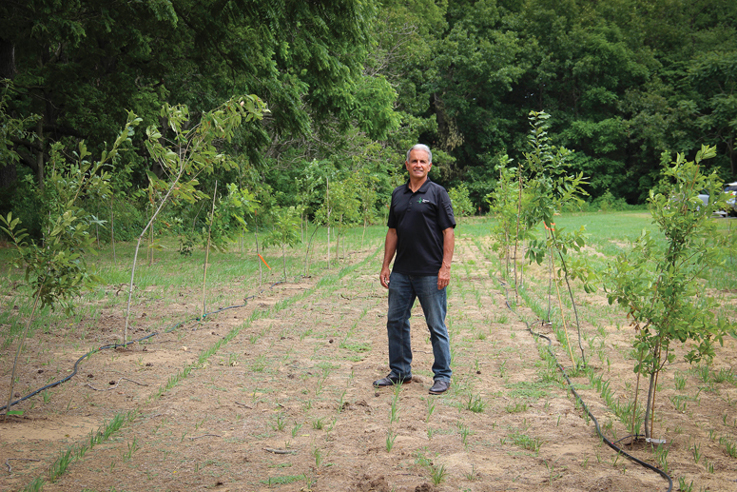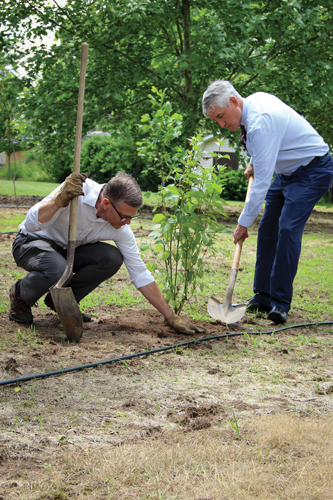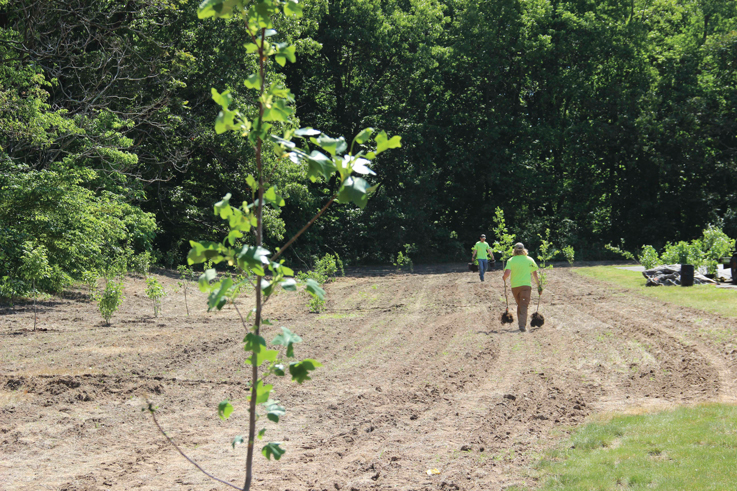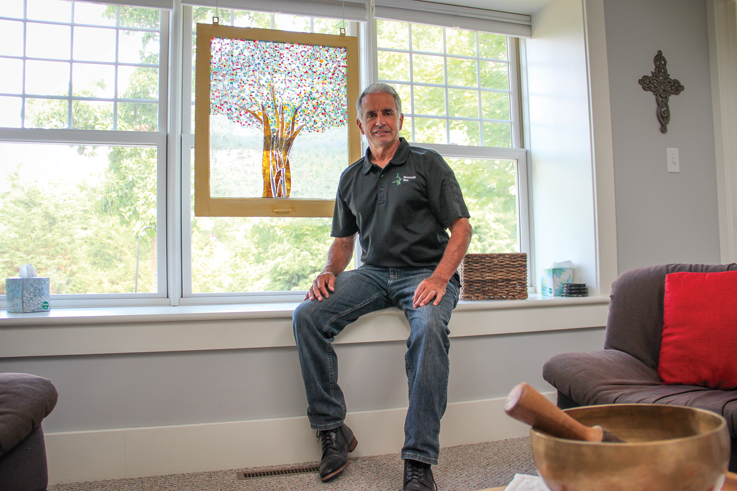Steve Thomas at one of the tree-planting sites at Everence. (Photos for this story by Brian Yoder Schlabach)
When two people separately contacted Steve Thomas to suggest a large-scale tree-planting campaign, they didn’t know who they were dealing with.
Steve serves as the U.S. Director of Mennonite Men, an organization that engages men to grow, give, and serve as followers of Jesus – which is why those two people – one living in Kenya and the other, in Virginia – contacted him.
Independently and out of the blue, both suggested that Mennonite Men consider a massive tree-planting effort to combat climate change.
Neither was aware of Steve’s calling to preach and teach about trees. Steve has been called a “treevangelist.” He’s a certified arborist with a graduate certificate in urban forestry. He provides tree consulting services and does contract structural pruning work for the City of Goshen, Indiana.
What Mennonite Men does
Mennonite Men operates JoinHands, a program that focuses on grants to help new congregations acquire their first church buildings. It also oversees JoinMen, which offers retreats and resources to promote healthy masculinity.
Although Steve naturally was interested in the tree-planting idea, “I wondered if it amounted to mission drift,” he said. “I wasn’t sure how trees fit.”
He took the proposal to Mennonite Men’s board of directors. The board said “yes,” which Steve says "is our organization’s response to address climate change.”
Chad Horning (left) and Ken Hochstetler of Everence plant a tree near the corporate headquarters building.
So JoinTrees was launched. The name may seem a bit unusual, but Steve said it means, “Join trees to restore the earth.”
Trees absorb carbon dioxide, which is added to the atmosphere from a variety of activities – from decomposing organisms to wildfires, and from venting volcanoes to fossil fuel burning.
The Arbor Day Foundation says one mature tree will absorb more than 48 pounds of CO2 from the atmosphere in one year, and release oxygen in exchange. But as more of the world’s forestry is cut down, fewer trees are available to absorb the increasing levels of CO2 in our atmosphere.
A million-tree goal
Mennonite Men’s goal is to plant 1 million trees – throughout the world – by 2030. And not just plant trees and walk away, but help them stay healthy and grow.
“It’s not just about planting trees, but establishing trees,” Steve said, “where they can survive and thrive in the landscape. It’s all about the right tree in the right place.”
In short, it all comes down to stewardship of the land we inhabit – caring for God’s creation by adding beauty and supporting biodiversity.
Although it’s coordinated by Mennonite Men, the JoinTrees effort is for all ages and genders.
A Goshen congregation planted 700 trees on Good Friday, with people of all generations participating. Reports from the church are that it was a very meaningful experience.
JoinTrees is reaching out to Anabaptist congregations, many of which have a long history of tending the land, Steve said.
The power of trees
Trees contribute to our lives in many ways, including these mentioned in materials JoinTrees uses to promote its 1-million-tree campaign:
- They store carbon dioxide and cool the planet.
- They clean the air of pollutants.
- They improve soil and water quality.
- They curb stormwater runoff.
- They absorb noise, providing a buffer between homes and industrial properties or traffic sounds.
- They support biodiversity.
- They provide shade, food, comfort and beauty.

JoinTrees is supporting tree planting on private land, public land, business properties and church properties – offering expertise and in some cases, grants to help defray expenses. Mennonite Men is collecting contributions to help with tree projects.
Steve and his colleagues are working with the Natural Resources Conservation Service, U.S. Fish and Wildlife Service, state Departments of Natural Resources, city governments and others interested in cultivating biodiversity and caring for the land.
Cutting down on mowing?
Some churches and businesses maintain large areas of grass (requiring regular mowing), which could be converted to trees and other native plants.
Keeping large areas of mowed grass attractive requires investments in fuel, water, chemicals and labor, Steve noted. Trees and other native plants can beautify an area while increasing the diversity of plant and animal life.
He said, “A number of congregations are forming creation care groups to look at these alternative approaches to landscaping.”
Some use the term “bioscaping.” Steve said that basically means, “landscaping for both beauty and biodiversity.”
Mennonite Men’s membership is mainly in the U.S. and Canada, but JoinTrees is branching out into other parts of the world as well.
Economic benefits realized
Several 40,000-tree projects have been going on in Central America, for example – mainly in Guatemala and Honduras, where land degraded through grazing and growing crops is being reclaimed. The newly planted trees – including fruit trees – can be an economic resource for the local communities.

“The small communities tend the trees,” Steve said. “They take greater care of them because they depend on them for their livelihood.”
In fact, community support is vital for large-scale tree projects to succeed, he said.
Get the community involved
Things work out better if the community is involved from the start, said Steve, who studied large-scale tree-planting campaigns when working on his graduate certificate in urban forestry. “It has to be community-based,” he said.
Environmental stewardship is part of caring for God’s creation, and tending God’s creation is what motivates Steve to care so much about trees.
He notes that a tree of life is featured at the beginning and end of the Bible, in Genesis and Revelation.
As a grandfather, Steve said he ponders two questions about climate change the children of today may ask him in the future: “Did you know?” and “What did you do?”

